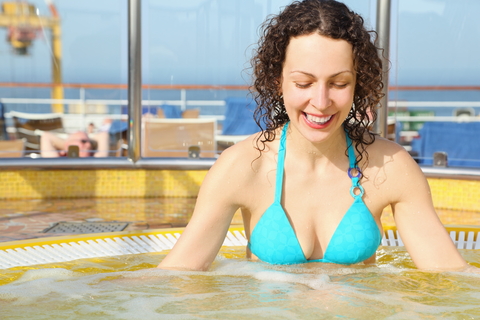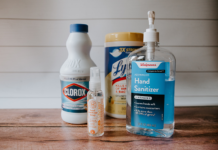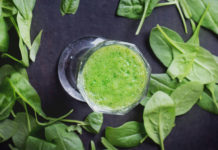
A vacation is supposed to be a fun, relaxing way to get away from it all. Unfortunately, it can also be when you’re most vulnerable to certain vacation-related health risks. With these tips, you can learn to avoid them.
Top 10 Vacation-Related Health Risks
1. Motion Sickness
Motion sickness, also called “traveler’s sickness” is a common complaint among vacationers when traveling or attempting to enjoy an amusement park ride. Motion sickness is caused by a discrepancy between your middle ear and what your eye is seeing.
Oftentimes, car passengers will feel sick from reading or texting in a car or watching the “world rush by” outside. Those who become seasick will feel ill from the rocking, rolling motion of a boat or just from looking at the waves.
Symptoms of motion sickness include excessive yawning, salivation, cold sweats, nausea, and vomiting. In and of itself, motion sickness isn’t a serious health risk but if the condition is serious enough, it can lead to electrolyte loss and difficulty with coordination that could lead to injury.
Natural treatments for motion sickness include ginger tea, ginger candies, and acupressure on a point called the “pericardium 6” (P6). This pressure point is located on the inside of the forearm, two inches about the crease in your wrist.
Alternatively, you can use a motion sickness armband that will produce the same result by offering continuous pressure.
2. Traveler’s Diarrhea
Traveler’s diarrhea is a problem for many vacation-goers and it can be caused by a few different factors. First, any type of change, even good change like a vacation, can prompt a stress response in your body.
Also, your eating habits change on vacation. You overindulge, try new foods, and may consume more alcohol than usual. This combination can lead to the development of traveler’s diarrhea due to unsanitary restaurant conditions or E. coli-contaminated foods like restaurant lemons, ice, street foods, shellfish, and salad bars.
Traveler’s diarrhea can also be the result of a parasitic infection, which can be transmitted via microscopic bits of fecal matter that end up in your food or drinking water.
3. Jet Lag
Jet lag is a problem for frequent business travelers and those who travel across several time zones on vacation. It is caused by a disruption in the body’s natural circadian rhythm and can result in symptoms such as excessive sleepiness, coordination problems, irritability, and difficulty with concentration, memory, and cognition.
Oftentimes, a dose or two of melatonin over the first few days of vacation and some extra bed rest can help you feel better fast.

4. Sunburn
When you’re on vacation, it can be very easy to forget just how much sun you’re actually getting. Unless you’re spending most of your time in museums or shops, you could be at risk for serious sunburn. However, unlike what conventional medicine has said for the past 30 years, I do not recommend complete avoidance from the sun to avoid skin cancer.
As a matter of fact, avoiding the sun can actually cause skin cancer!
For most people, fifteen to twenty minutes of unprotected sun exposure is perfectly safe. However, if you plan to be out for longer, I advise covering up with a wide-brimmed hat and a thin, long-sleeved shirt. If you choose to wear sunblock, be sure your brand is 100% percent organic and zinc oxide based. Many store-bought sunscreens contain potentially carcinogenic compounds that are best avoided.
5. Bug Bites and Stings
Bug bites and stings are a common vacation-related health risk, especially among campers, hikers, and fishing enthusiasts.
While most mosquito bites are more irksome than dangerous, there are some mosquitoes that carry the West Nile virus, a zoonotic arbovirus native to tropical regions. The West Nile virus is a neuroinvasive disease that can result in encephalitis, coma, and paralysis. Luckily, only 1 percent of those infected with this condition ever experience symptoms this severe.
Depending on where you’re traveling, spider bites and wasp stings can cause serious health problems. Black widow and brown recluse spiders are among the most dangerous and can be fatal if not treated by a medical professional immediately. If you’ve never been stung by a bee, hornet or wasp and experience your first one on vacation, you may develop a dangerous allergic reaction you never knew you had.
Tick-borne illness isn’t limited to only Lyme disease. Ticks can also cause Rocky Mountain spotted fever, Powassan disease, tularemia, Colorado tick fever, and anaplasmosis. After a hike or any long amount of time spent in the woods, be sure to do a full-body check for burrowing ticks. (You won’t feel them when they bite).
6. Skin Infections
A superficial cut or wound can develop into a serious skin infection on vacation. When you’re in a different environment your body hasn’t built immunity against, a simple cut or scrape can quickly become something more serious.
Protect yourself by addressing even minor wounds immediately. Taking the time to disinfect and put a bandage over a cut or scrape can keep you safe while you hike through underbrush, swim in a public pool or dance the night away at a less-than-sanitary downtown club.
7. Parasitic Infections
Parasitic infections are a serious yet often-overlooked health risk associated with vacations. Recently, a 12-year-old child contracted a brain-eating parasite while swimming at a water park. The parasite entered through her nose and infected what is called “The Triangle of Death”, a sensitive area of the face that is especially susceptible to bacterial and parasitic invasion.
8. Muscle Aches and Pains
Sleeping in odd positions during travel, carrying heavy luggage, and overexerting yourself at play can cause serious injury. Remember, just because you’re on vacation, doesn’t mean you’re a superhero so try not to overdo it. Natural pain and inflammation relief can be found in a turmeric or boswellia supplement.
9. Urinary Tract Infections
Bladder infections, like parasitic infections, can be easily picked up on vacation. If you find yourself feeling urinary urgency, frequency, difficulty with urination, and pain during urination, you may have developed a UTI.
Cranberry extract, oregano oil, vitamin C, goldenseal, and probiotics are all natural remedies you can use to treat a sudden urinary tract infection.
10. Upper Respiratory infections
Upper respiratory infections like the common cold or a sinus infection can ruin your vacation. At the first sign of a sniffle, load up on vitamin C and drink plenty of fluids. Also, get plenty of rest. After all, spending one day in bed to stave off a cold is much better than spending an entire two weeks there!
How to Prevent Getting Sick on Vacation
Most times, a little preparation is all you need to avoid common vacation-related illnesses.
- Boost Your Immune System
A strong immune system is your first line of defense against both sudden and chronic illness. If you haven’t already, slowly wean off highly-processed foods and trade them in for healthier fare such as organic produce, beans, legumes, nuts, seeds, meat, poultry, fish, and healthy fats like butter and coconut oil.
Also, adding an ultra high-grade multivitamin to your diet can help fill in the nutritional gaps caused by poor soil quality and pesticide contamination.
Most store-bought vitamins are synthetic and can actually do more harm to your health than good.

My Diamond Nutritional’s Foundation Formula contains ultra high-grade nutrition your body can actually absorb.
The immune-boosting nutrients include:
- Vitamin A – 7,500 IU
- Vitamin C – 500 mg
- Vitamin D3 – 500 IU
- Vitamin E – 100 IU
- Vitamin K – 50 mcg
- Thiamine – 25 mg
- Riboflavin – 25 mg
- Niacin – 25 mg
- Vitamin B6 – 38 mg
- Folic Acid – 400 mcg
- Vitamin B12 – 500 mcg
- Biotin – 200 mcg
- Panthothenic Acid – 150 mg
- Calcium – 100 mg
- Iodine – 113 mcg
- Magnesium – 200 mg
- Zinc – 10 mg
- Selenium – 100 mcg
- Copper – 1 mg
- Manganese – 2.5 mg
- Chromium – 200 mcg
- Molybdenum – 25 mcg
- Potassium – 50 mg
- Choline Bitartrate USP – 50 mg
- Inositol – 50 mg
- Mixed Tocopherols – 50 mg
- Lipoic Acid – 25 mg
- N-Acetyl-Cysteine USP – 25 mg
- Rutin – 25 mg
- Lutein – 3 mg
- Boron – 1.5 mg
- Lycopene – 1 mg
- Vanadyl Sulfate Hydrate – 1 mg

Over 85% of Americans are severely vitamin D3 deficient, leading to an increased susceptibility to a wide variety of disease and conditions. This is why I recommend you add my Diamond Nutritional’s Vitamin D3 – 5,000 IUs to boost your immune system and prevent chronic conditions.
Though many conventional physicians recommend taking 400 IUs per day, recent studies have suggested that this amount is not nearly enough for most adults.
Since 85% of your immune system is located in your gut, it is very important you keep it healthy and balanced. My Diamond Nutritional’s Probiotic Formula contains 22 billion live, active cultures designed to reseed your gut, improve your digestion, and give your immune system the boost it needs to keep you healthy.

This complete formula contains lactobacillus acidophilus, lactobacillus paracasei, bifidobacterium lactis, bifidobacterium bifidum, lactobacillus plantarum, lactobacillus rhamnosus, saccharomyces boulardii.
- Get Plenty of Rest
After poor diet, lack of sleep is a common cause of a depressed immune system. Be sure to get plenty of sleep both before and after your trip.
- Take the Right Supplies
Before you go on your trip, take a natural antibiotic such as oregano oil or clove oil and an antioxidant like N-Acetyl Cysteine. Probiotics are especially beneficial to your health as they boost your immune system and prevent the development of traveler’s diarrhea and UTI.
A first-aid kit containing natural antibiotics and pain killers as well as natural, Triclosan-free hand sanitizer, and bandages, can make your trip safer and can help protect you from disease.
- Practice Water Safety
Parasitic infection can be a serious health risk when swimming in stagnant ponds, rivers or public water parks. Teach your children to swim with their mouths closed and have them wear nose plugs to protect their “Triangle of Death” area. Make sure they shower immediately after swimming while wearing thong sandals to protect their feet as parasites and fungus can enter here as well.
You shouldn’t be sick on your vacation. The more preventative measures you take, the less risky your vacation will be.








